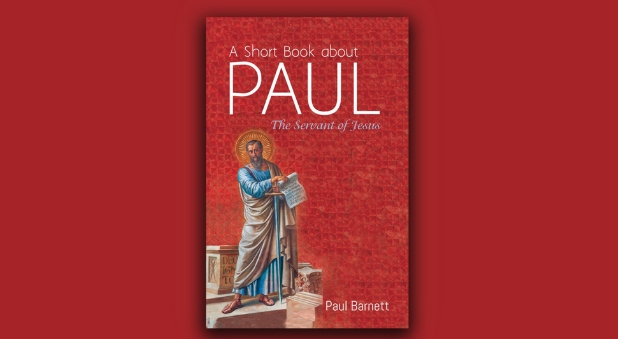A Short Book About Paul: The Servant of Jesus by Paul Barnett (Eugene: Cascade, 2019)
Review by Philip Kern
Historians don’t merely assemble a puzzle. Before considering how the pieces fit together, they need to determine which ones belong in the box. Some subjects offer an abundance of resources, while others leave us wishing for more.
The historian and theologian Paul Barnett combines mastery of his craft with a subject that provides plenty of pieces for someone who knows where to look. The result is that this portrait of the Apostle Paul, while relatively brief (I’ll come back to that in a moment), offers a rich presentation of his life and work.
The picture of Paul that emerges is fresh without being idiosyncratic.
A Short Book reveals a fuller, more textured portrait of the apostle in smaller compass than any other volume I’ve come across. It works because Barnett sees the pieces and their relationship to one another with exceptional clarity as he draws upon Paul’s writings, the Acts of the Apostles, the wider New Testament canon and sometimes Paul’s broader cultural setting. He fills each chapter with perceptive discussion that never becomes heavy. The result is a readable book that offers fresh insights at every turn.
Some elements are striking. Seeing all 40 of Paul’s companions listed over two pages testifies to his ability to build and work within a team. Equally engaging is Barnett’s presentation of Paul as both keeper of the tradition and theologian in his own right.
Paul’s indebtedness to the tradition – that is, teaching that finds its roots in the ministry of Jesus and is passed down by Peter and the Jerusalem church – shows Paul didn’t invent Christianity. He was, inevitably, forced by new situations and conflicts to extend the theological, liturgical and ethical traditions in new directions, but did so in ways entirely consistent with the truth he received.
As this theme unfolds across the arc of the book, Barnett shows how the apostle can simultaneously protect the tradition while bringing the gospel to bear on new realities. Such is the work of pastoral ministry.
A Short Book contains few footnotes, and the interaction with scholarship is minimal. This enhances the reading experience but on occasion raises a point of tension for me. I want the book to remain “a short book about Paul”, but occasionally would like more evidence. For example, Barnett on page 35 observes that “blasphemers” (such as the Christians persecuted by Saul) could choose either expulsion from the synagogue or undergoing 39 lashes. But how do we know the accused had these options? Of course, were such questions answered, the book would soon outgrow its title.
By the end of A Short Book the reader will have engaged with Paul’s biography, context and message. To his credit, Barnett doesn’t sidestep the challenges – including Paul’s purported arrogance, unnuanced view of gender relationships and homosexuality, or reorientation of the teaching of Jesus away from what was rich and affirming into an obsession with sin and the cross. Inevitably, not everyone will find Barnett persuasive on these issues, but his treatment combines pastoral warmth with historical and biblical evidence.
This slim volume is a valuable resource for members of Bible study groups, will no doubt be read by prospective theological college students, and will appear on reading lists for introduction-to-Paul courses. Few books cover the ground in such an engaging and accessible manner. I know of none which succeeds so thoroughly yet can still be called A Short Book About Paul.
Dr Philip Kern is head of Department of New Testament and Greek at Moore College.






















